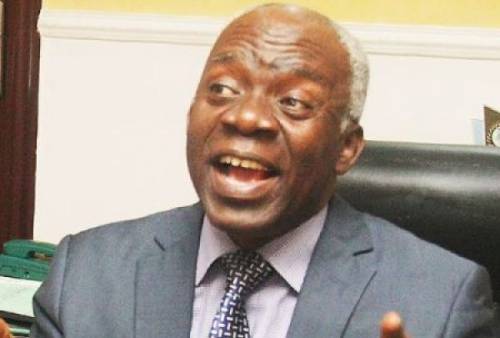
Falana made the remarks during an interview on Politics Today, a programme aired on Channels Television on Monday.
Nigerian human rights lawyer, Femi Falana, SAN, has strongly criticised President Bola Tinubu’s economic reforms, describing them as “harsh neoliberal policies” that have decimated the country’s middle class and deepened the sufferings of millions of Nigerians.
Falana made the remarks during an interview on Politics Today, a programme aired on Channels Television on Monday.
He expressed concerns that despite recent acknowledgements by President Tinubu regarding the rising economic hardship, his administration’s policies continue to worsen poverty and inequality across the nation.
The senior advocate also referenced the President’s reported call on governors elected under the All Progressives Congress (APC) to “wet the ground” and ease the burden on citizens.
However, Falana argued that such appeals had not translated into real relief.
“Because of the religious implementation of neoliberal policies by the government, poverty is on the ascendancy. That will require a review of these policies.”
Falana criticised the government’s privatisation agenda, arguing that it undermines efforts to address income inequality.
He urged the administration to realign its priorities and deliver targeted support to vulnerable Nigerians, particularly those living in rural communities.
According to him, “You cannot be addressing income inequality in a country while handing over the nation’s resources to a few people in the name of privatisation.
“Most Nigerians cannot afford three square meals a day. The middle class has been wiped out by the neoliberal policies of the government.
“The government must go back to the drawing board and review each of these policies, especially those pushed by the IMF and World Bank, in the interest of Nigerians. It is in the interest of the government to review its policies as soon as possible,” he added.
However, since taking office in May 2023, President Tinubu has rolled out major economic reforms, including currency liberalisation and the elimination of fuel subsidies.
Though aimed at stabilising the economy, these measures have led to a severe cost-of-living crisis, with inflation and poverty surging to troubling levels.
The fuel subsidy removal, in particular, caused petrol prices to skyrocket, sparking a chain reaction of rising transport costs, soaring food prices, and overall inflation.
The Senior advocate has called for the immediate implementation and legal reinforcement of social welfare programmes to ease the widespread hardship.
“To eradicate poverty, we must begin by implementing welfare laws,” he said, referring to the National Social Investment Programme (NSIP), which was codified under the Social Investment Programme Agency Act in 2023.
The National Social Investment Programme (NSIP) is a federal government initiative aimed at reducing poverty through various schemes, including N-Power for youth empowerment, the Government Enterprise and Empowerment Programme (GEEP), a school feeding programme, and conditional cash transfers to support vulnerable households.
“President Tinubu should be able to persuade the governors to codify social investment programmes and enact them into law,” Falana said.
Leave a Reply